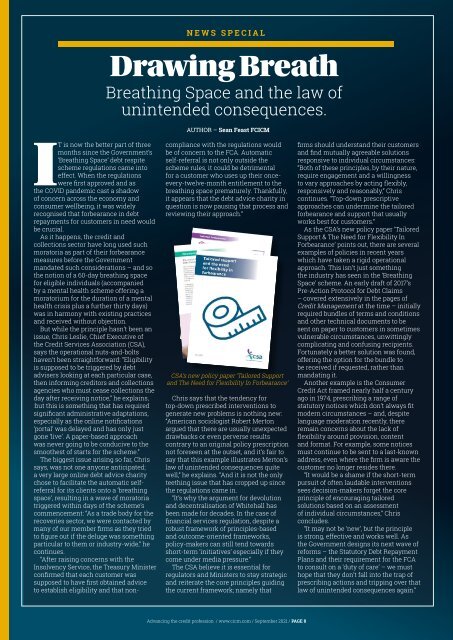CM September 2021
Create successful ePaper yourself
Turn your PDF publications into a flip-book with our unique Google optimized e-Paper software.
NEWS SPECIAL<br />
Drawing Breath<br />
Breathing Space and the law of<br />
unintended consequences.<br />
AUTHOR – Sean Feast FCI<strong>CM</strong><br />
IT is now the better part of three<br />
months since the Government’s<br />
‘Breathing Space’ debt respite<br />
scheme regulations came into<br />
effect. When the regulations<br />
were first approved and as<br />
the COVID pandemic cast a shadow<br />
of concern across the economy and<br />
consumer wellbeing, it was widely<br />
recognised that forbearance in debt<br />
repayments for customers in need would<br />
be crucial.<br />
As it happens, the credit and<br />
collections sector have long used such<br />
moratoria as part of their forbearance<br />
measures before the Government<br />
mandated such considerations – and so<br />
the notion of a 60-day breathing space<br />
for eligible individuals (accompanied<br />
by a mental health scheme offering a<br />
moratorium for the duration of a mental<br />
health crisis plus a further thirty days)<br />
was in harmony with existing practices<br />
and received without objection.<br />
But while the principle hasn’t been an<br />
issue, Chris Leslie, Chief Executive of<br />
the Credit Services Association (CSA),<br />
says the operational nuts-and-bolts<br />
haven’t been straightforward: “Eligibility<br />
is supposed to be triggered by debt<br />
advisers looking at each particular case,<br />
then informing creditors and collections<br />
agencies who must cease collections the<br />
day after receiving notice,” he explains,<br />
:but this is something that has required<br />
significant administrative adaptations,<br />
especially as the online notifications<br />
‘portal’ was delayed and has only just<br />
gone ‘live’. A paper-based approach<br />
was never going to be conducive to the<br />
smoothest of starts for the scheme.”<br />
The biggest issue arising so far, Chris<br />
says, was not one anyone anticipated;<br />
a very large online debt advice charity<br />
chose to facilitate the automatic selfreferral<br />
for its clients onto a ‘breathing<br />
space’, resulting in a wave of moratoria<br />
triggered within days of the scheme’s<br />
commencement: “As a trade body for the<br />
recoveries sector, we were contacted by<br />
many of our member firms as they tried<br />
to figure out if the deluge was something<br />
particular to them or industry-wide,” he<br />
continues.<br />
“After raising concerns with the<br />
Insolvency Service, the Treasury Minister<br />
confirmed that each customer was<br />
supposed to have first obtained advice<br />
to establish eligibility and that noncompliance<br />
with the regulations would<br />
be of concern to the FCA. Automatic<br />
self-referral is not only outside the<br />
scheme rules, it could be detrimental<br />
for a customer who uses up their onceevery-twelve-month<br />
entitlement to the<br />
breathing space prematurely. Thankfully,<br />
it appears that the debt advice charity in<br />
question is now pausing that process and<br />
reviewing their approach.”<br />
CSA’s new policy paper ‘Tailored Support<br />
and The Need for Flexibility In Forbearance’<br />
Chris says that the tendency for<br />
top-down prescribed interventions to<br />
generate new problems is nothing new:<br />
“American sociologist Robert Merton<br />
argued that there are usually unexpected<br />
drawbacks or even perverse results<br />
contrary to an original policy prescription<br />
not foreseen at the outset, and it’s fair to<br />
say that this example illustrates Merton’s<br />
law of unintended consequences quite<br />
well,” he explains. “And it is not the only<br />
teething issue that has cropped up since<br />
the regulations came in.<br />
“It’s why the argument for devolution<br />
and decentralisation of Whitehall has<br />
been made for decades. In the case of<br />
financial services regulation, despite a<br />
robust framework of principles-based<br />
and outcome-oriented frameworks,<br />
policy-makers can still tend towards<br />
short-term ‘initiatives’ especially if they<br />
come under media pressure.”<br />
The CSA believe it is essential for<br />
regulators and Ministers to stay strategic<br />
and reiterate the core principles guiding<br />
the current framework; namely that<br />
firms should understand their customers<br />
and find mutually agreeable solutions<br />
responsive to individual circumstances:<br />
“Both of these principles, by their nature,<br />
require engagement and a willingness<br />
to vary approaches by acting flexibly,<br />
responsively and reasonably,” Chris<br />
continues. “Top-down prescriptive<br />
approaches can undermine the tailored<br />
forbearance and support that usually<br />
works best for customers.”<br />
As the CSA’s new policy paper ‘Tailored<br />
Support & The Need for Flexibility In<br />
Forbearance’ points out, there are several<br />
examples of policies in recent years<br />
which have taken a rigid operational<br />
approach. This isn’t just something<br />
the industry has seen in the ‘Breathing<br />
Space’ scheme. An early draft of 2017’s<br />
Pre-Action Protocol for Debt Claims<br />
– covered extensively in the pages of<br />
Credit Management at the time – initially<br />
required bundles of terms and conditions<br />
and other technical documents to be<br />
sent on paper to customers in sometimes<br />
vulnerable circumstances, unwittingly<br />
complicating and confusing recipients.<br />
Fortunately a better solution was found,<br />
offering the option for the bundle to<br />
be received if requested, rather than<br />
mandating it.<br />
Another example is the Consumer<br />
Credit Act framed nearly half a century<br />
ago in 1974, prescribing a range of<br />
statutory notices which don’t always fit<br />
modern circumstances – and, despite<br />
language moderation recently, there<br />
remain concerns about the lack of<br />
flexibility around provision, content<br />
and format. For example, some notices<br />
must continue to be sent to a last-known<br />
address, even where the firm is aware the<br />
customer no longer resides there.<br />
“It would be a shame if the short-term<br />
pursuit of often laudable interventions<br />
sees decision-makers forget the core<br />
principle of encouraging tailored<br />
solutions based on an assessment<br />
of individual circumstances,” Chris<br />
concludes.<br />
“It may not be ‘new’, but the principle<br />
is strong, effective and works well. As<br />
the Government designs its next wave of<br />
reforms – the Statutory Debt Repayment<br />
Plans and their requirement for the FCA<br />
to consult on a ‘duty of care’ – we must<br />
hope that they don’t fall into the trap of<br />
prescribing actions and tripping over that<br />
law of unintended consequences again.”<br />
Advancing the credit profession / www.cicm.com / <strong>September</strong> <strong>2021</strong> / PAGE 8


















